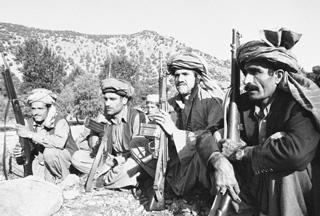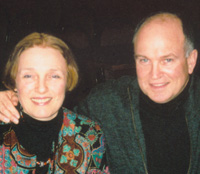| Home | Blog | Ask This | Showcase | Commentary | Comments | About Us | Contributors | Contact Us |

A history of failed press coverage of AfghanistanCOMMENTARY | October 300, 2009For decades, the American news media by and large have been simplistic and misleading in reporting U.S. relations toward Afghanistan, write Paul Fitzgerald and Elizabeth Gould. From 1981 on, they say, the press has kept vital information away from the American people. By Paul Fitzgerald and Elizabeth Gould For almost 30 years – ever since we got a close-in view of it – American press coverage of Afghanistan has been simplistic, misleading, unexamining, accepting and echoing government propaganda, and just plain wrong. There have been exceptions…but not many.
Beginning in 1981, we have experienced a process that has kept vital information away from the American people.
Following the expulsion of 1,135 western journalists one month after the Soviet invasion in 1979, we were the first to gain access to Afghanistan through diplomatic channels at the United Nations. Contracted to CBS Evening News with Dan Rather, our opportunity to see inside a Soviet-occupied Afghanistan revealed a complex story, and the footage we returned with didn’t conform to an evil empire image that, in our judgment, CBS reporting had been nurturing. Four weeks after our return, a story about our trip was aired, cross-cut with Soviet propaganda – that is, footage done by the Soviets – that in no way represented our experience. But as an anti-Soviet piece, it was masterful.
Then in 1983, under contract to ABC Nightline, we invited Roger Fisher, director of the Harvard Negotiation Project, to return with us to assess the chances of getting the Soviets to leave Afghanistan. Roger told us that the Kremlin's chief Afghan specialist said, point blank, "Give us six months to save face and we'll leave the Afghans to solve their own problems." This information was rejected as news by ABC World News Tonight. Then the Soviet request – as explained by Roger on Nightline – was framed in such a way by host Ted Koppel, that it dispelled any notion that there was a chance of a Soviet withdrawal.
As the decade of the 80s wore on, the Soviet occupation left the realm of journalism – there was almost no coverage – and became transformed into a Ramboesque struggle of holy warriors against the evil empire. Then in 1989 when the Soviets finally did withdraw, the Afghan story disappeared from the media’s radar completely. The cold war had ended and the mythology dictated that the U.S. had “won” it. The Afghan people were left to deal with the blowback from the mujahideen fighters who had been supported by the largest publicly known U.S. covert operation since Vietnam. Over the next few years that process would give rise to the Taliban and morph into the threat the U.S. faces today.
Without any serious reflection on the consequences of funding and training extremists for the purpose of defeating the Soviet Union, the American media not only missed the deeper story, but ignored numerous instances where the Afghan story had been corrupted for political purposes.
Articles in the New York Post by Janet Wilson in late 1989 and a Columbia Jounalism Review article by Mary Williams Walsh in early 1990 charged that CBS newscasts repeatedly aired fake battle footage and false news accounts. The accusations had no effect and caused no serious questioning by the media. It wasn’t until 9/11 that Afghanistan got back on the media’s radar. The crisis that had left 2 million dead, 6 million refugees, and a population of Afghan women in abject conditions finally came into view. (See this Amnesty International report.) But even today, the media continue to resist the deeper analysis necessary to bring about the kind of thinking required by America’s current intervention in Afghanistan.
Before, during and after the Soviet invasion the press largely accepted, without investigation, the view that a Muslim Holy War against communism was taking place. So much for independent reporting. Even when both Robert Gates, America’s current Secretary of Defense, and Zbigniew Brzezinski President Carter’s national security adviser, admitted in print (Gates, in his book, From the Shadows; Brzezinski, 1998 interview in Le Nouvel Observateur), that the U.S. had been secretly undermining its own diplomatic efforts in order to give the Soviets their own Vietnam in Afghanistan, the American press failed to see it as news. (Gates was a special assistant to Brzezinski in 1979 at the time of the invasion; he held high intelligence positions in the CIA in the early 80s and in 1986 was named deputy director of the CIA.)
Brzezinski's Nouvel Observateur remarks are addressed in a 2005 interview he did with Samira Goetschel for her film, Our Own Private Bin Laden. She asked: "In your 1998 interview with the French Magazine Le Nouvel Observateur you said that you knowingly increased the probability of the Soviet invasion of Afghanistan.” Brzezinski responded: “The point very simply was this. We knew the Soviets were already conducting operations in Afghanistan. We knew there was opposition in Afghanistan to the progressive effort which had been made by the Soviets to take over. And we felt therefore it made a lot of sense to support those that were resisting. And we decided to do that. Of course this probably convinced the Soviets even more to do what they were planning to do..."
As we document in our book, “Invisible History: Afghanistan's Untold Story," the record contradicts Brzezinski’s assumption that the Soviets would have invaded.
The world was remade with the Soviet folly in Afghanistan, a Communist empire destroyed and the West's pre-eminence assured. But the price in human suffering in Afghanistan and the impact on our democratic freedoms and aggressive press coverage has yet to be understood. Our personal experience with the media was an excellent example of how the Afghanistan story was framed to encourage war and to downplay peaceful settlement. Like the cold war itself, it is a framework that still haunts Afghanistan. Perhaps it has now come to haunt the United States even more.
|
||||||||||||||||




